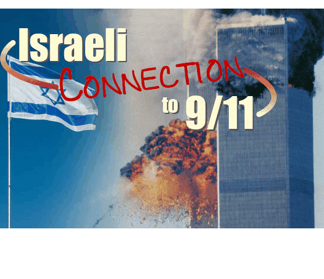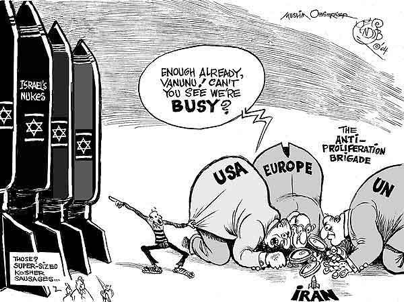By Rahnuma Ahmed
![]()
What Dr Alan Sabrosky has done is bell the cat. Except that it’s a dog, and not a cat.One that’s utterly mad. Insane.
In the words of late General Moshe Dayan, who went on to become Israel’s defense minister, and later foreign minister, Israel’s security depended on its being viewed by others as a mad dog.
Dr Sabrosky, who has been calling for a new investigation on 9/11 for some time, said in a recent radio interview (March 19), it would have been impossible to stage 9/11 without the full resources of both the CIA and Mossad. Nine-eleven, he said, served the interests of both the agencies. “They did 9/11. They did it.”
“..it is 100% certain that 9/11 was a Mossad operation. Period.” (Full transcript). Now if Dr Sabrosky had been let’s say, a Pakistani, or worse still, an Iranian, one could have pooh-poohed. A loony, like all mollahs are. If he’d been Muslim, one could have labelled him an anti-Semite. After all, the Iranian president denied the holocaust. That’s what the western media said and they’d never lie, would they? Crazy dictator with nuclear weapons. Will deny being from his mother’s womb next. Pathetic.
But unfortunately Alan Sabrosky (Ph.D, university of Michigan) is a ten year US Marine Corps veteran. A Vietnam war vet. An American of Jewish ancestry. He’s not only a graduate of the US Army War College, he was director of studies there. For five and a half years. Now if he says he’s convinced the Israelis did it… it’s to say the least, pretty difficult to ignore. Although the mainstream western media, the beacons of the free world, are doing their darndest best. Do a google search on Dr Sabrosky plus any of these beacons New York Times, Washington Post, The Guardian… BBC, CNN websites, your search will come to nought. It’s only in the alternative press. A few blogs. Pravda online. Less than a handful of 9-11 truth websites (no, not all, interesting, eh?). It’s only in these places that you’ll come across links to his interview. And his recent article, `The dark face of Jewish nationalism’ (March 12, 2010).
Jewish nationalism is unique, he writes. Prime minister Binyamin Netanyahu had said at a Likud gathering “Israel is not like other countries.” For once, he was speaking the truth. What makes its nationalism distinct to that of other countries?all the rest have both positive and negative aspects, both unifying and extremist features?Jewish nationalism is extremist per se. Among both secular and practising Jews. It is a real witches brew of xenophobia, racism, ultra-nationalism and militarism, a mixture that cannot be contained within a `mere’ nationalist context. Its `others’ have to be pushed out. Either into camps, or out of the country. Second, Zionism undermines civic loyalty among its adherents in other countries. Loyalty to Israel supersedes the loyalty to the country to which one belongs. Whether US or UK, or any other. For instance, Rahm Emanuel. He’s the White House chief of staff. The second most powerful person in the US. He served in the Israeli army but not in the US armed forces. Once independence is achieved, and this is the third feature of Jewish nationalism, it’s not unusual to have normal relations with the former occupying power. But no, not in the case of Israel. It has a long list of enemies. They have become America’s enemies too. Lastly, nationalist movements usually don’t displace the indigenous population wholesale, instead, they incorporate. They accommodate. The Americans are an exception, look what they did to the Indians/native Americans. Maybe that’s why most of them don’t care about what the Israelis are doing to the Palestinians.


In his radio interview with Mark Glenn and Phil Tourney (USS Liberty survivor), Sabrosky explains, most Americans don’t care much about what happened to the USS Liberty. For those who don’t know, I add, Israel attacked the US Naval ship USS Liberty in 1967 during the Six Day war. It was a false flag operation (like 9-11), the plan was to blame the attack on Egypt, to drag the US into the war. President Johnson seems to have known about it in advance; 34 Americans were murdered, 173 were wounded. Sabrosky says, That’s history. But 9-11 isn’t.
It has led directly to 60,000 Americans dead and wounded. In other countries, “hundreds of thousands of people.” Killed, wounded, made homeless. Tourney is sore about the Liberty, while Sabrosky himself is sore about Vietnam. But Americans are sore about 9-11 which is an “open wound.” He says, If Americans ever know that Israel did this, they’re gonna scrub them off the Earth, and they’re not gonna give a rat’s ass?forgive my language?what the cost is. They are not going to care. They will do it. And they should.
When Glenn asks Dr Sabrosky what is the reaction in US army circles (his work is being read by people in the Headquarters Marine Corps and at the Army War College) to his conviction that 9-11 was a Mossad operation, he answers, at first, astonishment. Disbelief. He does not get into arguments, he says. Who was flying what, who was where, whether there was nano-thermite (high-tech energetic materials prepared under military contracts in the USA, part of secret military research) or not, “those things are true, but they’re incidental.” What is necessary is to tell people that three buildings went down, the third was not hit by a plane. He then shows them an interview with a Danish demolitions expert, Danny Jowenko. It shows WTC7 going down. I tell them, “Now you understand that if one of the buildings was wired for demolition, all of them were wired for demolition.” And that, says Sabrosky, is the tipping point. At that point, people get angry. Really angry. And they say, “They did it, didn’t they.” He replies, “Yep?they did it.
” While asking Dr Sabrosky what he thinks is going to happen, Glenn says he himself thinks that Israel is going to pull off another 9-11, “sooner than any of us realize or would like to envision.” That powerful people think so too, such as the Joint Chiefs of Staff, Mike Mullen who cut short a trip to Europe several years ago (July 2008), quickly flew to Israel, to warn them that there should not be “another USS Liberty part two.” That a part two would already have occurred if increasing numbers of people had not been talking about 9-11. He adds, “I think that Israel has been watching all of this and has been saying, “We need to kind of let things cool a little bit for now?if we try to pull another one off right now then that’s it: we’re going to blow our cover.”
Sabrosky butts in saying, If Americans ever truly understand that they’ve been had, Israel will be history. “It’ll be a bloody, brutal war.” Israeli leverage, he explains, is confined to political appointments?to the Congress, to the White House. And to the media (“the mainstream media have paid more attention to Sarah Palin’s wardrobe than they have to dissecting blatant falsehoods”). But “the military has not been bought.” It is loyal. If it ever really, really deeply understands this, that they did 9-11, that the US government could in any way be involved in high crimes and treason against the people of the United States, “Israel’s going to disappear. Israel will flat-ass disappear from this Earth.”
And what does he think is going to happen soon? “We’re going to have a war with Iran.” The Arab street is going to explode. There are American forces, American units, like the 5th fleet headquarters in Bahrain, there’s going to be a long casualty list. If the Iraqi resistance had not been so strong, the attack on Iran, which was the “big prize” all along, would have happened in the second Bush administration. The pattern, he’s convinced, was: Afghanistan in 2001, Iraq 2003, Iran 2005, Syria 2007. The time frame now is a bit different, and although he’s not sure as to how it’s playing out, they are trying to “create an excuse for a war.”
I myself find it interesting that the Iranian president Mahmoud Ahmadinejad recently wrote a letter to Ban Ki-Moon, the UN Secretary General (April 13, 2010) urging him to appoint an independent fact-finding team, a trustworthy one, to launch a comprehensive investigation into the “main culprits” behind the September 11 attacks since that is the “principal excuse” for attacking the Middle East. For NATO’s military presence in Afghanistan and Iraq. For making policies and launching military actions on the “pretext of fighting terrorism.
” Israel is a “monster,” Dr Sabrosky has written elsewhere (`I Express My Jewish Identity in Cuisine, Not in Foreign Policy’ July 9, 2009). And although more and more American Jews are speaking out, it might be too little too late. “Excising this ultra-Zionist/neo-con cancer is not going to be easy.” Maybe what needs to be done, an option that general Dayan had neglected to note, is to “kill that mad dog before it can decide to go berserk and bite.”
Extreme nationalism begging extreme solutions.
Published in New Age, April 26, 2010
![]()
